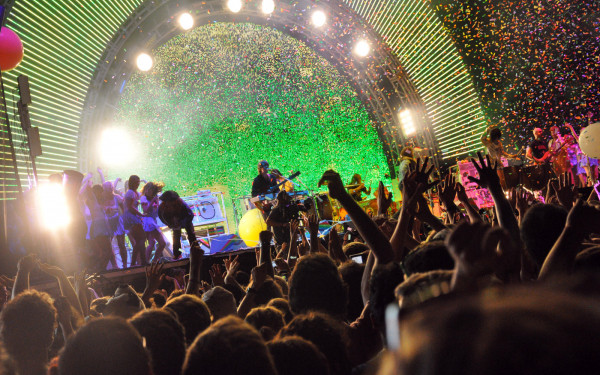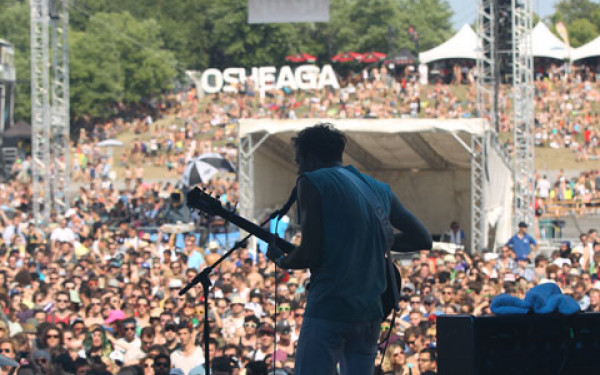Trying to Make Osheaga Safer
From Sexual Assault to Drug Consumption
Whether Evenko likes it or not, people will always take drugs at Osheaga.
With that in mind, how is Osheaga working around this, in comparison to previous years?
GRIP Montreal, the Groupe de recherche et d’intervention psychosociale, has been present at Osheaga for the past four years. Their team focuses on harm reduction for those who choose to use psychoactive drugs.
In previous years, GRIP set up booths at Osheaga, where they provide educational material about drugs most commonly used by festival goers. They also try to reduce the harm associated with drug use by handing out things like free straws and condoms.
The same kind of booth was found again this weekend at Osheaga by the electronic music stage, but more and more GRIP Montreal is working on providing something distinct: a haven space for those who need a time out. Meant to be a place of relaxation and safety, the haven was staffed by a team of volunteers—mainly university students—who have an educational background in psychology, social services, or other related fields.
“Some will also be inside of the medical tents to aid the medical teams, (specifically) for those who are having psychological problems,” explained Jessica Turmel from GRIP Montreal.
For party-goers, the haven was a place to go if you needed to dissociate from the high stress that’s typical of Osheaga, and operated as the ideal space for anyone who happened to be experiencing an overwhelming drug trip.
Similar set ups have been found at other festivals in Canada, like at the Shambhala festival that happens each August near Nelson, BC.
GRIP Montreal also provides it’s services to Montreal’s underground rave scene. GRIP attends these parties with a team of sober volunteers who focus on keeping people safe on the dancefloor. Trained in sexual assault and oppression harm reduction, they work hand in hand with party organizers and their security to make sure anyone who is causing trouble on the dancefloor stops or is shown the door.
“[Festival organizers] really needed something urgently to intervene in the problem for women, and that’s where the Hirondelles came in.”— Jennifer Lessare.
Drug Testing
This summer, GRIP Montreal encouraged Evenko, the group that organizes festivals like Osheaga and Îlesoniq, to provide places on site where attendees can go to test drugs. But that hasn’t been achieved yet, explained Turmel.
“We really wanted to do drug testing [at Osheaga],” she said, but they weren’t able to since the OK needs to come from the Canadian government first.
Though it’s debatable how much drug testing would actually improve safety for festival goers, it may prevent someone from consuming something that differs from what they were told they were sold. But drug tests can’t do anything to prevent users from overindulging or forgetting to drink enough water. Even more, drug tests that look for the presence of fentanyl are hard to come by.
So far, the Shambhala festival seems to be the only Canadian festival that has got the OK from the Canadian government to have drug testing booths on site.
GRIP Montreal is also expected to attend the electronic music festival ÎlSoniq, which will be held next weekend. They’ll also be at the electro parade planned for Montreal’s 375th celebrations.
Working Around Sexual Assault
But when it comes to harm reduction, Osheaga isn’t only focusing on drug consumption—they’re also looking to improve safety for women and LGBTQ+ attendees.
In June, the Conseil des Montréalaises (the Montreal Women’s Council) released results from a survey they did of 976 Montreal women, which found that 56 per cent of respondents said they had been sexually harassed while attending festivals in the city.
In response to that, Osheaga has introduced a new type of security that specifically specializes in trying to prevent sexual assault and providing safety for women and LGBTQ+ folk. Titled the Hirondelles, these security guards were distinct in that their uniform had a pink emblem of a pair of swallows.
“[Festival organizers] really needed something urgently to intervene in the problem for women, and that’s where the Hirondelles came in,” explained one Hirondelle Jennifer Lessare.
The Hirondelles are an all female team, and each have a background in sexology, social services, or other related fields.
They received their training from the CALACS (Le regroupement québécois des centres d’aide et de lutte contre les agressions à caractère sexuel), a province wide organization that runs sexual assault help centres.
Women were encouraged to approach them if they ever felt unsafe during the event, and Hirondelles were also staffed at various tents around the site that were meant to serve as safe spaces. They also patrolled alongside the regular security.
Evenko’s PR declined The Link’s offer on site to discuss the issue further, referring us instead to a press release they sent off at the end of June.

_850_567_90.JPG)
_600_832_s.png)

1_600_375_90_s_c1.jpg)
_600_375_90_s_c1.jpg)

